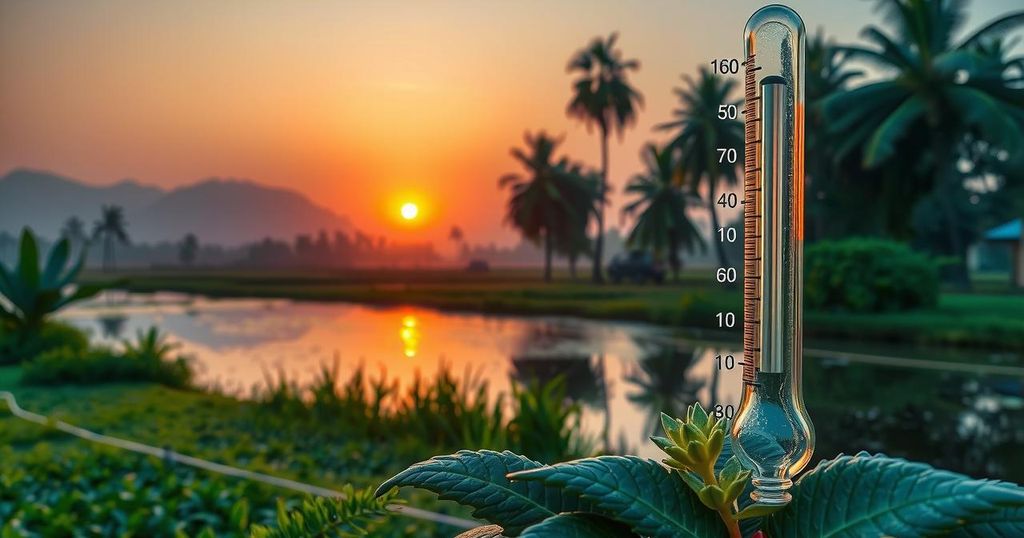Rising Temperature Trends in Kerala: A Warning for 2025 Heat Wave

Rising temperatures in February suggest Kerala may experience extreme heat into 2025, following the record-setting year of 2024. Local expert Neetha K. Gopal warns of potential health and agricultural impacts as average temperatures rise. Monitoring weather patterns is crucial for preparing adaptive strategies to mitigate climate change effects.
Kerala’s climate is notably distinct, influenced by its geographic structure between the Arabian Sea and the Western Ghats. Typically, the state experiences a transitional climate with seasons blending together. Lately, Kerala has encountered escalating temperatures, with February showing signs of being hotter, potentially forecasting 2025 as another scorching year. Recent data reflects a 2-degree Celsius increase above normal temperatures in areas like Thiruvananthapuram, signaling worrying climate trends.
Neetha K. Gopal, Head of IMD Kerala, remarks that although Kerala’s winters are mild, the transition month of February has shown marked temperature deviations attributed to climate change. She emphasizes the importance of monitoring these changes which are evidenced by the substantial daily maximum temperature recorded. The IMD anticipates an increase in heat, indicating that hotter days lie ahead for the state.
The IMD’s normal temperature benchmarks are derived from a 30-year average, suggesting that any significant deviation hints at climate change influences. Gopal warns that climate extremes pose threats not just to human health but can adversely affect agriculture and livestock. With no immediate prospects for rain, the situation could escalate, necessitating preemptive measures to safeguard local industries and biodiversity.
To prepare for these climatic challenges, relevant authorities are formulating long-term strategies to mitigate impacts on agriculture and biodiversity due to climbing temperatures. Weather forecasts from the IMD provide critical data that enables multiple governmental departments to implement interventions for managing resources effectively amidst these climatic fluctuations.
Amid such temperature rises, Kerala faces serious risks as heat waves threaten the health of both humans and ecosystems. If conditions worsen from 35 degrees to 40 degrees Celsius or above, the effects could be severe, underscoring the urgency for adaptive measures in light of an anticipated hotter summer ahead.
According to the World Meteorological Organization, 2024 was documented as the hottest year recorded, with the preceding decade showcasing significant temperature increments. Each degree of global warming correlates with a 7-percent increase in extreme daily rainfall, raising alarms for Kerala due to its vulnerable ecosystems which require immediate, solid strategies to counter these effects as severe climatic phenomena intensify.
The article addresses the rising temperatures in Kerala, marking a potential increase in heat for the approaching years, specifically focusing on February as a critical month in indicating climatic changes. It sets up the context of Kerala’s unique climatic situation compared to the Indian subcontinent, detailing how geographic factors influence seasonal transitions. This background is crucial as it highlights the significance of monitoring temperature changes while preparing for potential agricultural and health impacts in the future due to climate change.
In summary, Kerala is witnessing a troubling rise in temperatures, indicating that 2025 could be another extraordinarily hot year following the record-breaking conditions of 2024. Experts highlight the critical nature of monitoring these changes and implementing preventive measures for agriculture and health. Given the state’s delicate ecosystem, urgency lies in proactive adaptation strategies to mitigate the risks posed by climate extremes and potential heatwaves.
Original Source: www.onmanorama.com






